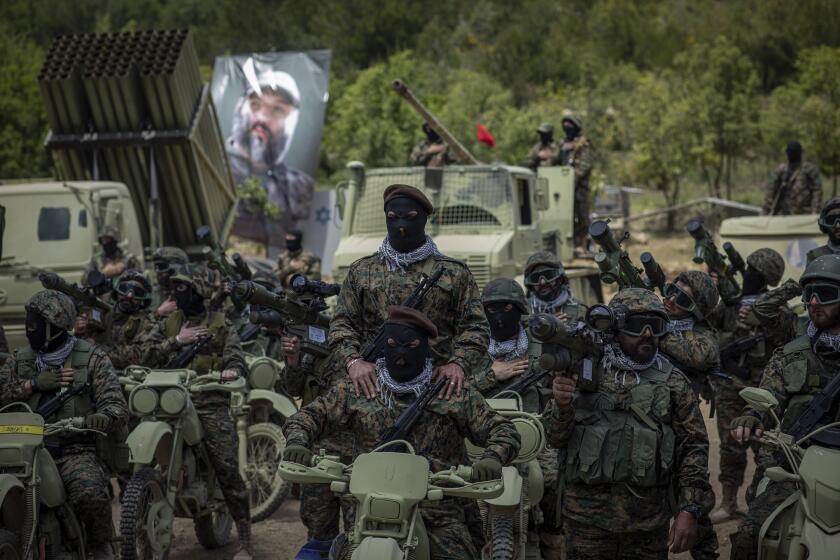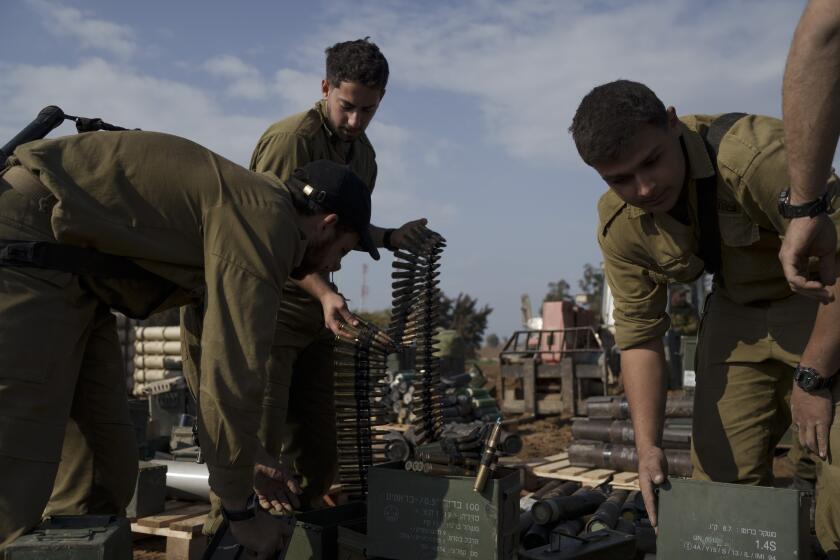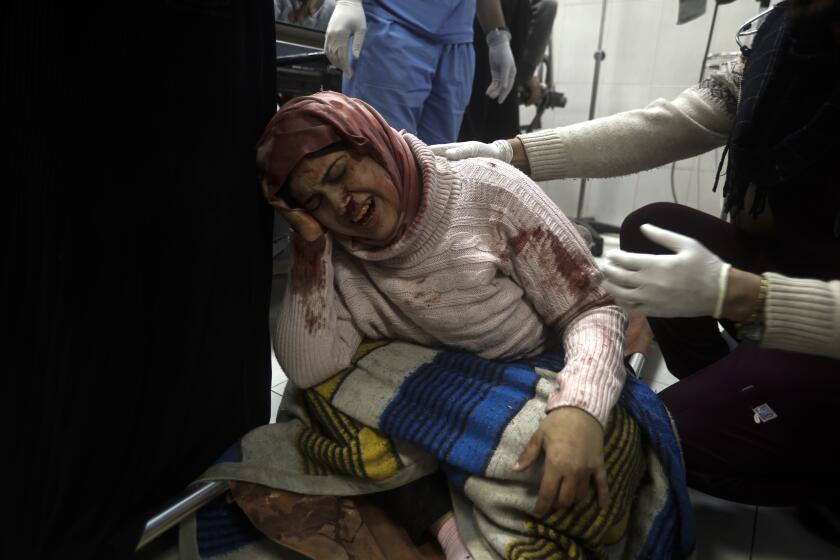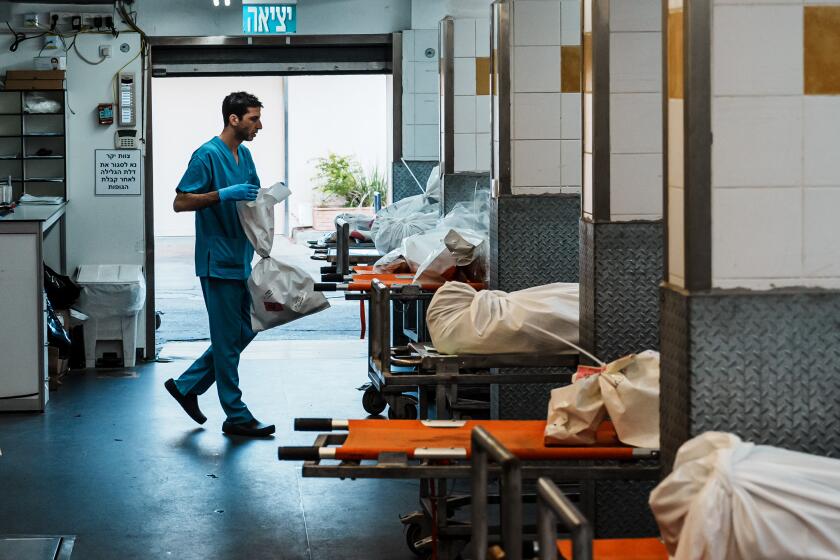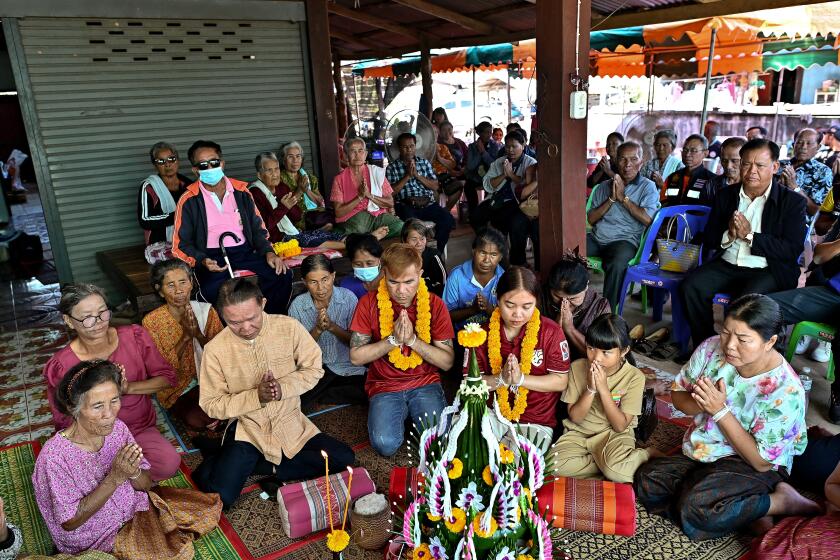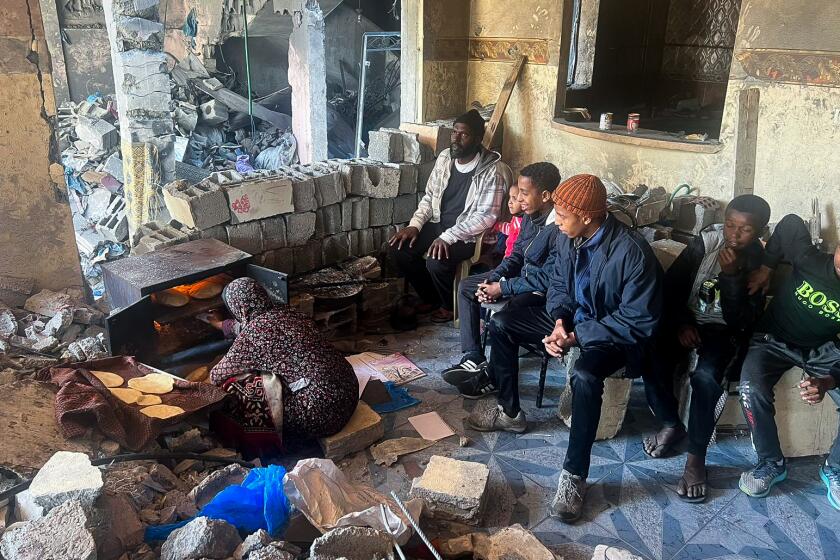Israel’s Mossad chief vows to hunt down Hamas members a day after senior figure killed in strike
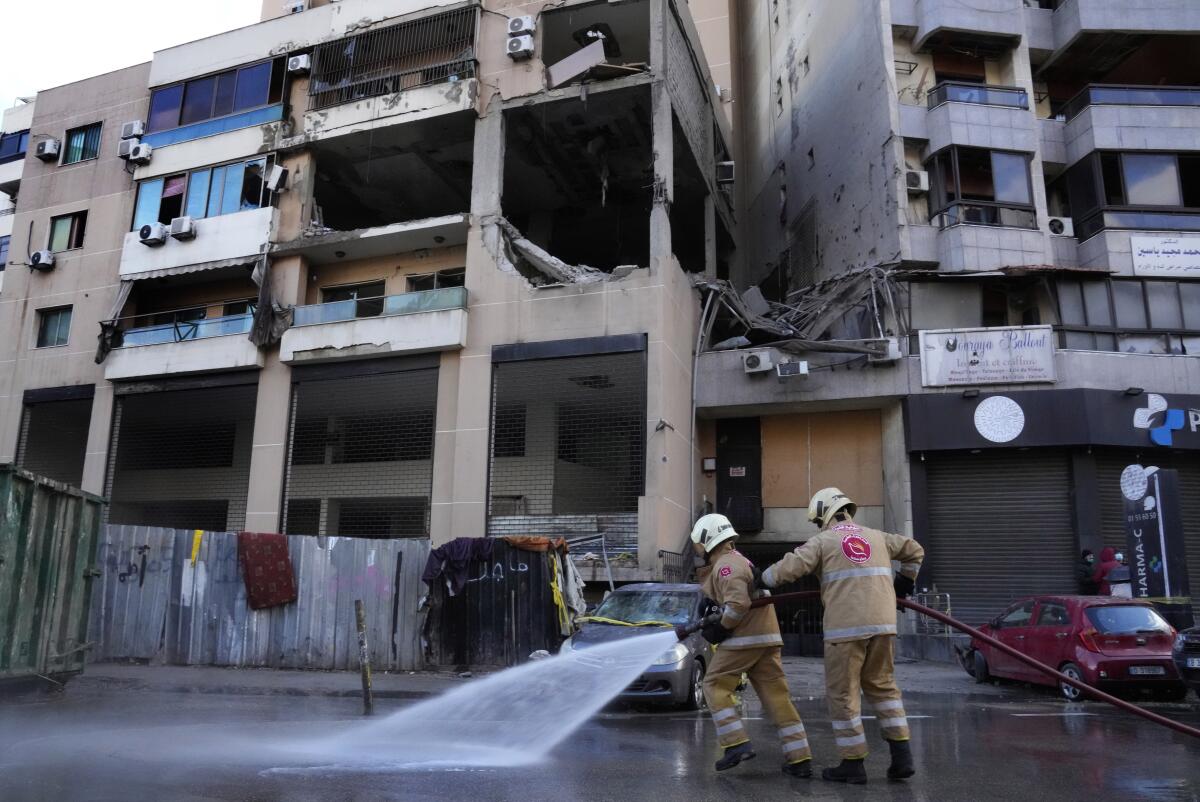
- Share via
JERUSALEM — The chief of Israel’s Mossad intelligence service vowed Wednesday that the agency would hunt down every Hamas member involved in the Oct. 7 attack on Israel, no matter where they are. He made the pledge a day after the deputy head of the Palestinian militant group was killed in a suspected Israeli strike near Beirut.
Israel has refused to comment on reports that it carried out the killing, but the comments by David Barnea appeared to be the strongest indication yet it was behind the blast. He made a comparison to the aftermath of the slayings at the Munich Olympics in 1972, when Mossad agents tracked down and killed Palestinian militants involved in abducting and killing Israeli athletes.
Israel was on high alert Wednesday for an escalation with Lebanon’s powerful Hezbollah militia after the strikenear the Lebanese capital killed Saleh Arouri, the most senior Hamas member slain since the war in Gaza erupted nearly three months ago.
The strike in Hezbollah’s southern Beirut-area stronghold could cause the low-intensity fighting along the Lebanon border to boil over into all-out war.
Lebanon-based Hezbollah is holding back from all-out war with Israel for now — but chances of a dangerous miscalculation by either side are high.
In a speech Wednesday evening, Hezbollah leader Hassan Nasrallah promised revenge, repeating his group’s statement that “this dangerous crime” of Arouri’s killing will not go “without response and without punishment.”
Nasrallah said Hezbollah had so far been careful in its strategic calculus in the conflict, balancing “the need to support Gaza and to take into account Lebanese national interests.” But if the Israelis launch a war on Lebanon, the group is ready for a “fight without limits.”
“They will regret it,” he said. “It will be very, very, very costly.”
Arouri’s killing provided a morale boost for Israelis still reeling from the Oct. 7 attack as the militants put up stiff resistance in Gaza and continue to hold scores of hostages.
Barnea said the Mossad is “committed to settling accounts with the murderers who raided the Gaza envelope,” referring to the area of southern Israel attacked on Oct. 7. He vowed to pursue everyone involved, “directly or indirectly,” including “planners and envoys.”
Saleh Arouri was the most senior Hamas figure killed since the war began nearly three months ago. His killing risks provoking major retaliation from Lebanon’s powerful Hezbollah militia.
“It’ll take time, as it took time after the Munich massacre, but we will put our hands on them wherever they are,” he said. Barnea was speaking at the funeral of former Mossad head Zvi Zamir, who died at age 98 a day earlier.
Zamir headed the intelligence agency at the time of the 1972 Munich Olympic attack, in which Palestinian militants killed 11 members of the Israeli delegation. Israel subsequently killed members of the Black September militant group who had carried out the attack.
A high-profile target
Hezbollah and the Israeli military have been exchanging fire almost daily over the Israeli-Lebanese border since the war in Gaza began, but Nasrallah has appeared reluctant to escalate it further, perhaps fearing a repeat of the monthlong 2006 war, in which Israel heavily bombed Beirut and southern Lebanon.
At the same time, Hezbollah also faces pressure to show support for its ally Hamas.
Nasrallah’s comments on balancing interests reflected the group’s wariness of being blamed by Lebanese if its exchanges with Israel spiral into an all-out war that brings destruction similar to the 2006 war. He avoided specifics on any possible reprisal for Arouri’s killing, though he said he would address the issue further in a speech Friday.
But he said if Israel attacks Lebanon, it would be in the national interest to fight back. “We are not afraid of war,” he said. “If the enemy thinks about launching a war against Lebanon, then we will fight back without ceilings and without limits.”
Hezbollah boasts an arsenal of tens of thousands of rockets and missiles as well as different types of drones. The United States has sought to prevent any widening of the conflict, including by deploying two aircraft carriers and other military assets to the region. Secretary of State Antony J. Blinken was expected in the region this week.
Nasrallah praised Arouri as well as the group’s Oct. 7 attack, saying it “brought light back onto the Palestinian cause after it was nearly forgotten.” He said Israel has so far failed in all its objectives in the Gaza war and was suffering damage to its international reputation.
The Israeli military chief of staff, Lt. Col. Herzi Halevi, visited Israel’s northern border with Lebanon on Wednesday, saying, “We are on high readiness in the north.”
Hamas leaders clearly expect Hezbollah to support its cause.
In an interview Saturday, three days before Arouri’s killing, the Associated Press asked Beirut-based Hamas political official Osama Hamdan if the group was worried about the possibility of Israel assassinating its officials in Lebanon.
Hamdan predicted that Hezbollah would not let that go unpunished, and an all-out war would ensue.
Israeli warplanes have struck two urban refugee camps in central Gaza with hopes for a halt in fire seemingly out of reach.
“So why would Israel want to do that? Does it want a war” in Lebanon? he asked. “War can happen if Israel acts wrongly and aggressively,” or war might not occur “if Israel takes a step back and acts in a way that is not aggressive against Lebanon.”
Hezbollah also announced that its fighters carried out at least 11 attacks against Israeli posts along the border, including four using heavy warhead Burkan rockets. The statement did not directly link its actions to Arouri’s killing.
Arouri was the deputy of Hamas’ supreme political leader, Ismail Haniyeh, and headed the group’s presence in the Israeli-occupied West Bank. He was also a key liaison with Hezbollah.
A U.S. official confirmed that the Israeli military carried out the strike that killed Arouri and did not give the White House advance notice. The official spoke on condition of anonymity because they were not authorized to discuss the operation.
A forensic investigator in Tel Aviv works to reassemble remains of victims of Hamas militants, trying to understand the causes of death and the underlying cruelty.
For a Thai farmworker taken hostage by Hamas militants Oct. 7, memories of Israel and Gaza are of love, grief and heartbreak for those she left behind.
The strike would be the first time since the war that Israel has reached into another country to target Hamas leaders, many of whom live in exile around the region.
The Mossad chief’s comments suggested more assassinations of Hamas figures were to come, echoing threats by Prime Minister Benjamin Netanyahu to kill Hamas leaders wherever they are. The group’s Oct. 7 attack from Gaza into southern Israel killed about 1,200 people, and some 240 others were taken hostage.
Israel seeks ‘clear victory’ in Gaza
The focus of the war remains on Gaza, where Israeli Defense Minister Yoav Gallant said Israel is seeking a “clear victory” over Hamas, which has ruled the territory since 2007.
Israel’s air, ground and sea assault in Gaza has killed more than 22,300 people, two-thirds of them women and children, according to the Health Ministry in the Hamas-ruled territory. The count does not differentiate between civilians and combatants.
‘I just don’t know where we’ll go.’ It’s a question Palestinians ask over and over in Gaza as Israel ramps up bombardment after Hamas truce collapsed.
The war has driven some 85% of Gaza’s population from their homes, forcing hundreds of thousands of people into overcrowded shelters or teeming tent camps in Israeli-designated safe areas that the military has nevertheless bombed. A quarter of Gaza’s population faces starvation, according to the United Nations, as Israeli restrictions and heavy fighting hinder aid delivery.
The unprecedented death and destruction has led South Africa to accuse Israel of genocide in a case filed with the International Court of Justice, allegations Israel has strongly denied and vowed to contest.
Still, Israel appears far from achieving its goals of crushing Hamas and returning the estimated 129 hostages still held by the group after more than 100 were released in a cease-fire deal in November.
Gallant said several thousand Hamas fighters remain in northern Gaza, where Israeli troops have been battling militants for nearly three months and where entire neighborhoods have been blasted into rubble.
Heavy fighting is also underway in central Gaza and the southern city of Khan Yunis, where Israeli officials say Hamas’ military structure is still largely intact. Yahya Sinwar, Hamas’ top leader in Gaza, and his deputies have thus far eluded Israeli forces.
Goldenberg reported from Jerusalem, Tawil from Beirut and Magdy from Cairo. AP writers Abby Sewell and Bassem Mroue in Beirut and Tara Copp in Washington contributed to this report.
More to Read
Sign up for Essential California
The most important California stories and recommendations in your inbox every morning.
You may occasionally receive promotional content from the Los Angeles Times.
